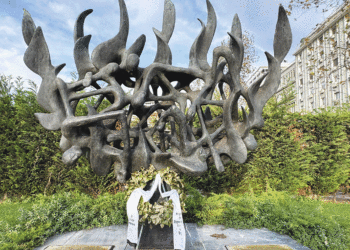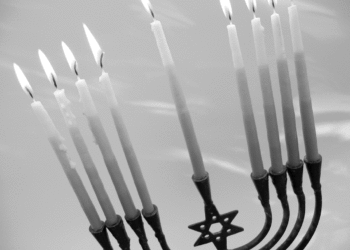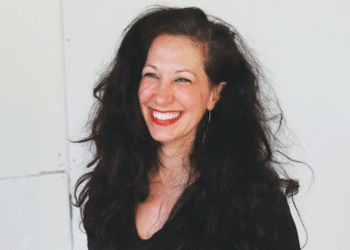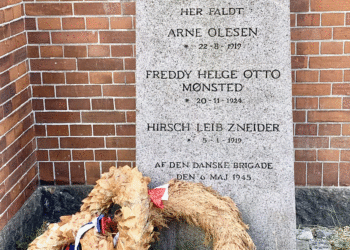For my family at least, Judaism isn’t and can’t be a simple matter of biology
By SUSAN GOLDBERG
But will the children be Jewish?
“Of course they will,” I thought. So, I’m sure, did many of my girlfriends who were raised in the Conservative Jewish tradition. For us, the so-called “matrilineal principle” held sway: we had been taught that if a child has a Jewish mother, then that child is automatically Jewish, no matter what the father’s religious background. For many of us who entered into interfaith relationships, this relatively arbitrary rule was a small comfort: no one could deny that our kids would be Jewish.
InterfaithFamily.com
But what if a child has two mothers? And what if those mothers have used a sperm donor — perhaps Jewish, perhaps not — to conceive their children? All of a sudden questions of identity, heredity, biology and religion — not to mention concepts like “chosen family” and queer politics — become that much more complicated.
 Susan Goldberg
Susan Goldberg
As a Jewish woman, married to a (mostly lapsed) Catholic woman, with a non-Jewish sperm donor, these questions loomed large as my partner and I pondered the possibility of having kids. I’m not religious, but I realized that I was fairly emotionally invested in the idea that my kids would be Jewish. Partly for those reasons, I was relieved when we decided that I would be the one to get pregnant. The matrilineal principle would kick in, the kids would be Jewish, and everything would be just fine.
Right?
But the more I thought about it, that position didn’t sit well with the very nature of the family I was about to create. It seemed downright hypocritical to accept, no questions asked, that our kids’ religion was a biological fact, while at the same time creating a family where at least one parent was not biologically related to the children.
Eight years and two children later, I have never been more convinced that parenting has almost nothing to do with biology and everything to do with the grueling, daily (and middle-of-the-nightly) grind of responsibility and duty — and even occasional joy — that comes from raising small people.
Over the same time span, I’ve also come to understand the same thing about what it means to be Jewish. For my family at least, Judaism isn’t and can’t be a simple matter of biology. Instead, like parenting, it’s a matter of the commitments and the choices we make in our everyday lives. In the same way that our children are our children through the daily routines and rhythms of our family life, they are Jewish — at least to us — by the cyclical routine and ritual of Judaism. Which is why I go to the trouble of baking challa and lighting Shabbat candles with them every week. Which is why we haul them to our tiny synagogue’s Hebrew school early on Sunday mornings. Which is why we make the trip by airplane each Passover to participate in raucous seders with grandparents and cousins and friends.
At the same time, understanding my religion the way I understand my parenting has allowed for more flexibility in the way that I practice Judaism.
If a tradition or a rule — like, say, the matrilineal principle — doesn’t work, if it’s outdated, sexist, homophobic, or otherwise rests on values that don’t jibe with my own, I’m much more comfortable with the idea of jettisoning it to make way for something new. Olives on the Passover seder plate in solidarity with Palestinian farmers, rewriting the Purim megilla (story) with a recognition of Esther and Vashti’s contributions, referring to God as “She” as often as we do to “He,” including our foremothers as well as our forefathers in the blessings we recite over our sons’ heads on Friday nights. Because why wouldn’t we want them to benefit from the best qualities of all their ancestors?
My family’s Judaism, like my family itself, is a work in progress. As the heads of a two-mama (plus cherished donor dad) family, my partner and I can’t rely on assumptions around gender roles when it comes to parenting. And as an interfaith family, we can’t rely on unquestioned assumptions about Judaism when it comes to our religious practices. More and more, I realize just how much my Judaism has not only been affected, but also enriched, by my queerness: being forced to create new paths in one area of my life has yielded unexpected blessings in many others.
***
Susan Goldberg is a writer, editor and blogger, and is coeditor of the anthology And Baby Makes More: Known Donors, Queer Parents and Our Unexpected Families. She blogs at mamanongrata.com.
This article was originially published on InterfaithFamily.com.
(American Jewish World, 3.16.12)









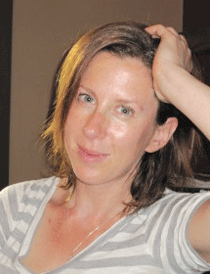 Susan Goldberg
Susan Goldberg
